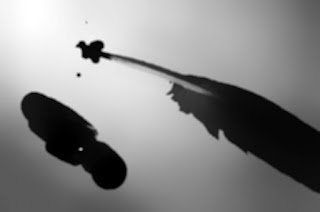It's Not Them, but Me
There is an ancient saying from the Mediterranean area, with which you're already familiar: "Know thyself."
Identity. Who knows?
If there's ever a reason for anything, it's to find a sense of identity. Think about culture, race, religion, family, friends, etc. You'll find all of these things give us a little clue about who we are as individuals.
It's not an easy journey to discover one's self, though. Conor Oberst put eloquently what it is to get lost in the search:
So I have been hanging out down by the trains depot.
No, I don't ride. I just sit and watch the people there.
And they remind me of wind-up cars in motion.
The way they spin and turn and jockey for positions.
And I want to scream out that it all is nonsense.
All your lives one track, can't you see it's pointless?
But then, my knees give under me.
My head feels weak and suddenly
it's clear to see that it's not them but me,
who has lost my self-identity.
As I hide behind these books I read,
while scribbling my poetry,
like art could save a wretch like me,
with some ideal ideology
that no one can hope to achieve.
And I am never real; it is just a sketch of me.
And everything I made is trite and cheap
and a waste of paint, of tape, of time.
~"Waste of Paint", Bright Eyes
When a person has a sense of their identity, it leads to action. Personal identity requires a fulfillment of purpose, and no purpose can be fulfilled through apathy. Apathy, therefore, leads to a loss of identity, and a loss of identity leads to waste. Truly, apathy is manifest only when someone has no concept of their identity, or when someone has neglected their identity for too long.
That's just it, isn't it: How do you find your identity in the first place?
You can keep tabs on your surroundings, to start. What do you see every day? What do you listen to? What do you say? How do you behave?
 |
| Maybe you haven't noticed the skull on the ground. Change your angle. |
In art, there's something called forced perspective. That's when the artist uses distinct characteristics within a piece to isolate the position of a piece's focal point. As an example: if I draw a stick figure, I'll make that figure seem close or far, big or small, tall or short, etc., by surrounding it with other shapes and shades to give the viewer indicators as to what I want this stick figure to look like. As a human, instead of a stick figure, surrounded by your environment, it's physically obvious that you are not your surroundings. It's plain to see that you are not other people. You are not your pets. You are not your technology, your bed, not even your clothes. However, these can be indicators of what your true identity is. Your innermost desires and thoughts--the truest version of your personality--will create the environment which surrounds you at all times. Everything from the color or your shirt, to the condition of your living space, will indicate your innermost Self. Just like the artist's use of perspective, you can use these things to gauge your identity. You are not what surrounds you, but what surrounds you indicates who you are.
You'll quickly observe that you, as a person, are not perfect. This is important to admit. You can see, quite clearly, if you need to improve something in your life by checking your surroundings. Now, if you parallel these surroundings to what might need improvement in your personality, you might be able to improve one by improving its parallel. For example: your bedroom might be parallel with your mind, because your bedroom is where you put your body to rest, and your mind is where your thoughts go to rest. If you have cluttered thoughts as well as a cluttered bedroom, and cluttered thoughts are becoming a problem, maybe developing a habit of organizing your bedroom will help develop the habit of organizing your thoughts. This is not to say that is the only way to interpret the meaning of a clean bedroom or vice versa, but it fits the procedure of self-reflection using one's surroundings.
Our identities are constantly looking into our faces, yet they somehow remain overlooked by some of us. "Know thyself" is a plea for discovering your identity, and how you fit in the world, possibly even the gamut of existence.
And, if you come to learn your role as a being who exists and has the immense power to choose and act. will the world around you not bend to your will?



Comments
Post a Comment